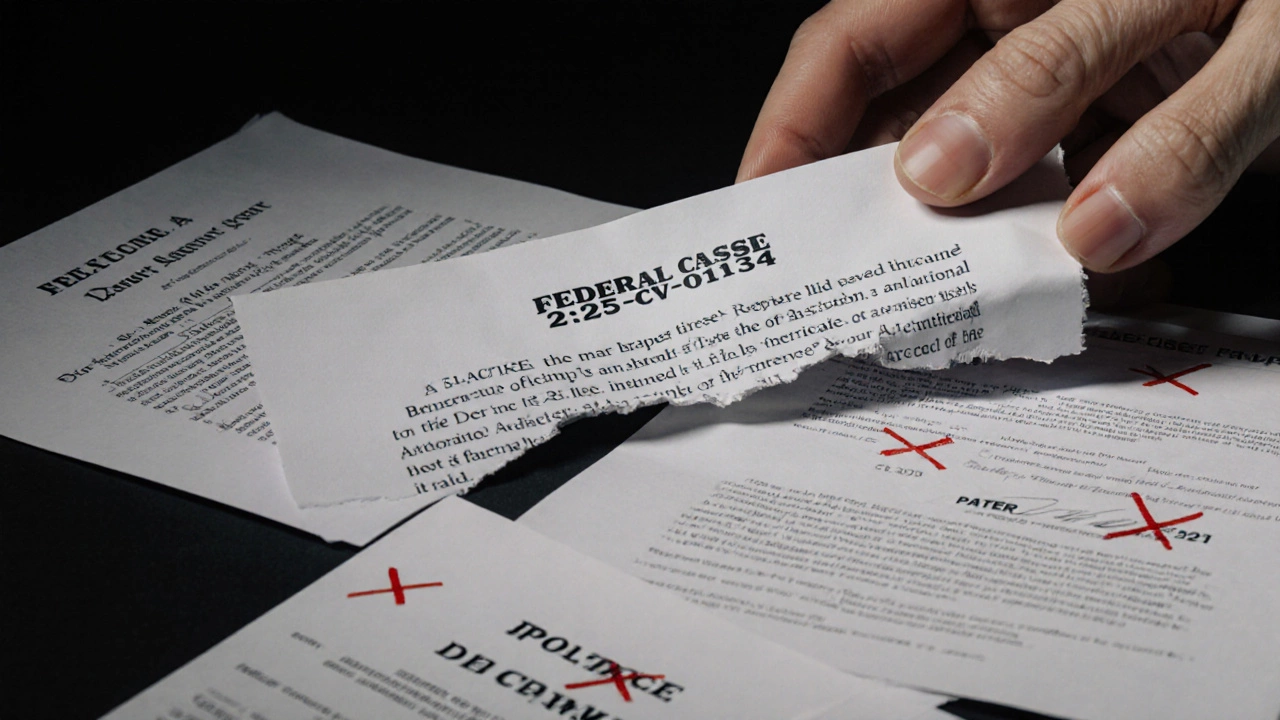Federal Court Jurisdiction Checker
Is This a Federal Case?
Answer a few simple questions to determine if your case would likely be heard in federal court based on federal jurisdiction rules.
Most people think all legal problems go to the same court. That’s not true. If you’re dealing with a dispute that involves the U.S. government, crosses state lines, or touches on federal laws, you might be in a federal case-not a state one. And the difference matters a lot. Federal courts don’t handle divorce, small claims, or most traffic tickets. But if you’re suing a federal agency, dealing with a civil rights violation, or fighting over a contract between businesses in different states, you could be in federal territory.
What Makes a Case Federal?
A case becomes federal when it meets one of two main criteria: federal question jurisdiction or diversity jurisdiction. These aren’t legal jargon you need to memorize-they’re simple rules that determine where your case belongs.
Federal question jurisdiction means your case involves a law passed by Congress, the U.S. Constitution, or a treaty. For example, if you’re being denied your First Amendment rights by a government employee, or if your employer is violating the Americans with Disabilities Act, that’s a federal question. The law itself is the reason you’re in federal court.
Diversity jurisdiction kicks in when two parties are from different states (or one is from a foreign country) and the amount in dispute is over $75,000. Let’s say you live in Texas and a company based in California sold you faulty equipment that cost you $90,000 in lost business. Even if no federal law was broken, the fact that you’re from one state and the defendant is from another, plus the money involved, gives federal courts the right to hear it.
These two rules cover over 90% of civil federal cases. If neither applies, your case almost certainly belongs in state court.
Common Types of Federal Civil Cases
Not every lawsuit against the government is federal, but many are. Here are the most common civil cases that land in federal court:
- Claims against federal agencies (like the IRS denying your refund or the VA mishandling your benefits)
- Civil rights violations under federal law (police brutality, housing discrimination, workplace harassment based on race or gender)
- Antitrust cases (big companies colluding to fix prices or monopolize a market)
- Patent, copyright, or trademark infringement
- Securities fraud (stock market scams regulated by the SEC)
- Class action lawsuits where plaintiffs from multiple states are suing the same company
- Disputes over federal contracts (like a construction company suing the Department of Defense for unpaid work)
If your case fits any of these, you’re likely in federal court territory. State courts don’t handle patent lawsuits, for example. Even if you’re suing a private company, if it’s about a federal trademark, it’s federal.
What You Won’t Find in Federal Court
It’s just as important to know what federal courts don’t handle. Many people assume federal means "bigger" or "more serious," but that’s not the case. Here’s what stays in state court:
- Divorce and child custody
- Landlord-tenant disputes
- Most personal injury cases (car accidents, slip and falls)
- Small claims under $75,000
- Probate and wills
- State tax disputes
- Most contract disputes between people in the same state
If you’re suing your neighbor over a fence line or you got rear-ended on I-95 in Ohio, that’s state court. Even if the accident caused $200,000 in damages, unless the other driver is from a different state and you’re claiming over $75,000, it’s still state court.

How to Tell If You’re Already in a Federal Case
If you’ve already filed paperwork, check the court name. Federal cases are filed in U.S. District Courts. You’ll see names like:
- U.S. District Court for the Southern District of New York
- U.S. District Court for the Central District of California
State courts use names like "Superior Court of California" or "Circuit Court of Cook County." If your case number starts with "2:25-cv-01234," that’s federal (the "cv" stands for civil, and the number format is federal). State case numbers usually start with letters like "CV-2025-00123."
Also, look at your summons or complaint. If it cites federal statutes like 42 U.S.C. § 1983 (civil rights) or 15 U.S.C. § 1 (Sherman Antitrust Act), you’re in federal court. If it only references state laws like "California Civil Code § 1714," you’re in state court.
Why Does It Matter?
Choosing the wrong court can get your case thrown out-or delay it for months. Federal courts have stricter rules on deadlines, evidence, and procedure. They also have fewer judges and longer wait times. But they also offer advantages: federal judges are appointed for life, so they’re less influenced by local politics. Federal courts are also more likely to handle complex cases involving expert testimony or nationwide class actions.
If you’re trying to sue a big corporation that operates in 10 states, federal court might be your best shot. If you’re trying to get your security deposit back from a landlord in your own city, state court is faster and cheaper.

What to Do Next
If you’re unsure whether your case is federal, start by asking three questions:
- Is the U.S. government or a federal agency a party in the case?
- Is the dispute based on a federal law, the Constitution, or a treaty?
- Are the parties from different states, and is the amount in dispute over $75,000?
If you answered "yes" to any of those, you’re likely in a federal case. If not, you’re probably in state court.
Don’t guess. Check the actual documents you’ve received. Look at the court name, the case number, and the laws cited. If you’re still unsure, talk to a lawyer who handles civil litigation. Many offer free 15-minute consultations. Bring your paperwork-don’t rely on memory.
Trying to file in the wrong court wastes time and money. Federal courts won’t take your case just because you think it’s important. They only take what the law says they can.
Frequently Asked Questions
Can I move my case from state court to federal court?
Yes, but only under specific conditions. The defendant can "remove" the case to federal court if it meets federal jurisdiction rules-like diversity of citizenship or a federal question. But the plaintiff can’t just move it there. If you filed in state court and the other side thinks it belongs in federal court, they can ask to transfer it. You can’t force the move yourself unless you file a new case in federal court and drop the state one.
Do I need a lawyer for a federal civil case?
You’re not legally required to have one, but federal court rules are complex. Filing deadlines, discovery rules, and evidentiary standards are stricter than in state court. Most people who represent themselves in federal court lose, not because their case is weak, but because they miss a procedural step. If your case involves more than $10,000 or any federal law, hiring a lawyer is strongly advised.
What if I don’t know where the other party lives?
You still need to establish diversity jurisdiction. If you can’t prove the other party is from a different state, you can’t use diversity as a reason for federal court. You’ll have to file in state court-or find another basis, like a federal law violation. Courts take jurisdiction seriously. If you claim diversity but can’t prove it, your case will be dismissed.
Can I file a federal case if I’m not a U.S. citizen?
Yes. Federal courts hear cases involving foreign nationals, especially if they’re suing a U.S. company or government agency. Your immigration status doesn’t affect your right to sue in federal court. What matters is whether the case meets federal jurisdiction rules-like a federal law violation or diversity of citizenship.
How long do federal civil cases take?
On average, federal civil cases take 18 to 24 months from filing to trial. Some settle faster; others drag on for years, especially if they involve complex documents or multiple parties. State courts often resolve similar cases in 12 to 18 months. Federal courts are slower because they handle more complicated matters and have heavier dockets.
